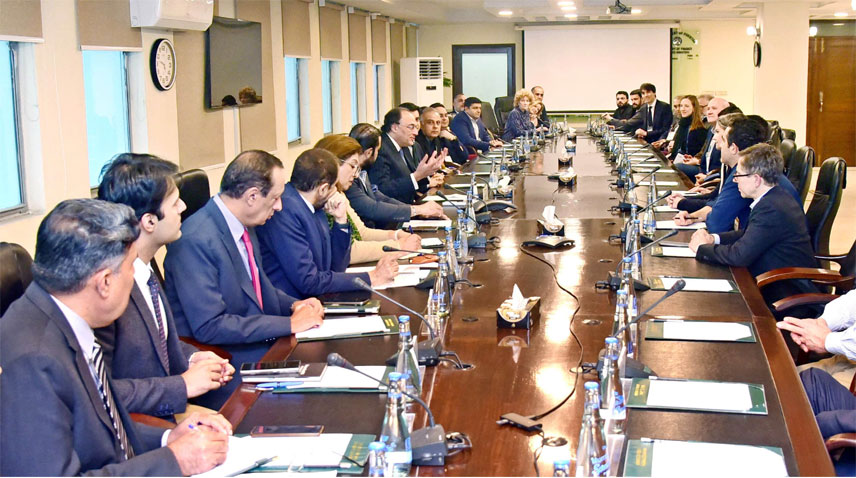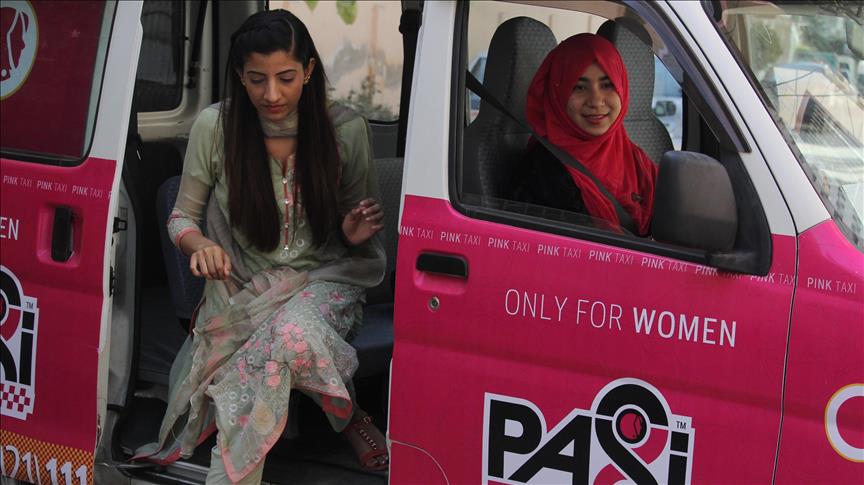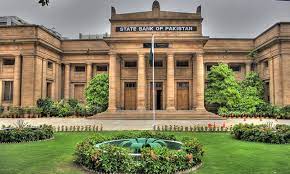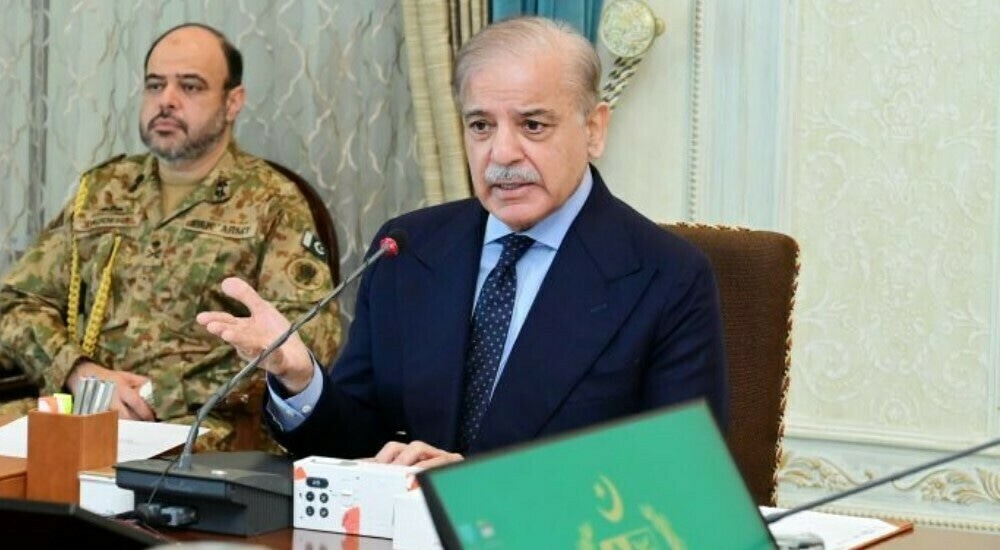PTBP Web Desk
A delegation of prominent foreign investors and business professionals, predominantly from the United States, met with Federal Minister for Finance and Revenue, Senator Muhammad Aurangzeb, at the Finance Division on Monday. The meeting, organized by Ambassador Ali Jehangir Siddiqui of JS Bank, served as a platform to explore investment opportunities and strengthen US-Pakistan economic ties, according to an official press release.
The delegation included leading figures from various industries such as technology, academia, and finance. Key attendees comprised Auren Hoffman, Chief Executive Officer of Safe Graph; Kristen Edwards Marqua from Hakluyt & Company; Michael Levi of The DE Shaw Group; and Dr. Jeff Chang, co-founder of Rad AI, among others.
Ambassador Siddiqui opened the meeting by introducing the delegation and outlining the objectives of their visit. He highlighted their interactions with diverse stakeholders across Pakistan, aiming to foster collaboration in areas of mutual interest. Advisor to the Finance Minister Khurram Shehzad, senior officials from the Finance Division, and representatives from the Federal Board of Revenue (FBR) were also present at the session.
Finance Minister Aurangzeb welcomed the delegation and presented a detailed overview of Pakistan’s recent macroeconomic achievements. He emphasized the government’s efforts in addressing long-standing economic challenges, such as the twin deficits.
“Pakistan has historically faced challenges with fiscal and current account deficits. However, improved export performance and fiscal discipline have brought the economy into a surplus. Our foreign exchange reserves now exceed $12 billion, inflation has reduced to single digits, and the policy rate is on a favorable trajectory,” the minister explained.
He further elaborated on the government’s ambitious reform agenda, which includes privatization, restructuring state-owned enterprises (SOEs), reducing the size of the federal government, and implementing pension reforms.
The finance minister underscored two critical issues: rapid population growth and climate change. With Pakistan’s population growth rate exceeding 2%, the country faces serious implications for food security, child stunting, and the number of out-of-school children.
“Climate change exacerbates these vulnerabilities, necessitating urgent financial and technical assistance to address them effectively,” Senator Aurangzeb stated. He also shared insights from his discussions with international stakeholders, including World Bank President Ajay Banga, about prioritizing these challenges.
During the meeting, the finance minister addressed various questions from the delegation. In response to queries about implementing International Monetary Fund (IMF) conditions and structural reforms, he highlighted the government’s commitment to achieving its goals.
“The willingness and ability to execute reforms are crucial. While significant work remains, maintaining momentum and staying committed will lead to the desired outcomes,” he remarked.
He also emphasized the importance of the private sector in driving economic growth. “The government’s responsibility is to establish a consistent policy framework and ensure stability. However, it is the private sector that must lead the economy toward growth. Our focus is on creating an enabling environment to facilitate this transition,” he added.
The US delegation appreciated the government’s efforts in stabilizing Pakistan’s economy. They expressed interest in exploring areas of collaboration, including innovation, investment, and financial inclusion.
The meeting concluded with a shared resolve to strengthen US-Pakistan cooperation. Both parties emphasized the importance of achieving mutual economic goals and addressing shared challenges, paving the way for deeper collaboration between the two nations.
The session highlighted Pakistan’s potential as a destination for international investment and reaffirmed the government’s commitment to fostering an investor-friendly climate.
A delegation of prominent foreign investors and business professionals, predominantly from the United States, met with Federal Minister for Finance and Revenue, Senator Muhammad Aurangzeb, at the Finance Division on Monday. The meeting, organized by Ambassador Ali Jehangir Siddiqui of JS Bank, served as a platform to explore investment opportunities and strengthen US-Pakistan economic ties, according to an official press release.
The delegation included leading figures from various industries such as technology, academia, and finance. Key attendees comprised Auren Hoffman, Chief Executive Officer of Safe Graph; Kristen Edwards Marqua from Hakluyt & Company; Michael Levi of The DE Shaw Group; and Dr. Jeff Chang, co-founder of Rad AI, among others.
Ambassador Siddiqui opened the meeting by introducing the delegation and outlining the objectives of their visit. He highlighted their interactions with diverse stakeholders across Pakistan, aiming to foster collaboration in areas of mutual interest. Advisor to the Finance Minister Khurram Shehzad, senior officials from the Finance Division, and representatives from the Federal Board of Revenue (FBR) were also present at the session.
Finance Minister Aurangzeb welcomed the delegation and presented a detailed overview of Pakistan’s recent macroeconomic achievements. He emphasized the government’s efforts in addressing long-standing economic challenges, such as the twin deficits.
“Pakistan has historically faced challenges with fiscal and current account deficits. However, improved export performance and fiscal discipline have brought the economy into a surplus. Our foreign exchange reserves now exceed $12 billion, inflation has reduced to single digits, and the policy rate is on a favorable trajectory,” the minister explained.
He further elaborated on the government’s ambitious reform agenda, which includes privatization, restructuring state-owned enterprises (SOEs), reducing the size of the federal government, and implementing pension reforms.
The finance minister underscored two critical issues: rapid population growth and climate change. With Pakistan’s population growth rate exceeding 2%, the country faces serious implications for food security, child stunting, and the number of out-of-school children.
“Climate change exacerbates these vulnerabilities, necessitating urgent financial and technical assistance to address them effectively,” Senator Aurangzeb stated. He also shared insights from his discussions with international stakeholders, including World Bank President Ajay Banga, about prioritizing these challenges.
During the meeting, the finance minister addressed various questions from the delegation. In response to queries about implementing International Monetary Fund (IMF) conditions and structural reforms, he highlighted the government’s commitment to achieving its goals.
“The willingness and ability to execute reforms are crucial. While significant work remains, maintaining momentum and staying committed will lead to the desired outcomes,” he remarked.
He also emphasized the importance of the private sector in driving economic growth. “The government’s responsibility is to establish a consistent policy framework and ensure stability. However, it is the private sector that must lead the economy toward growth. Our focus is on creating an enabling environment to facilitate this transition,” he added.
The US delegation appreciated the government’s efforts in stabilizing Pakistan’s economy. They expressed interest in exploring areas of collaboration, including innovation, investment, and financial inclusion.
The meeting concluded with a shared resolve to strengthen US-Pakistan cooperation. Both parties emphasized the importance of achieving mutual economic goals and addressing shared challenges, paving the way for deeper collaboration between the two nations.
The session highlighted Pakistan’s potential as a destination for international investment and reaffirmed the government’s commitment to fostering an investor-friendly climate.




